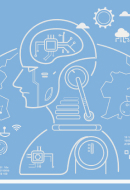What is big data and what is it used for?
Big data: main uses and applications
Nowadays, almost 18.8 billion connected devices share information over the Internet. In 2025, this figure will rise up to 20,000 million. Big data analyses this "sea of data" to convert it into the information that is transforming our world.

The digital revolution is changing the economy, society and people. The data generated by thousands of millions of devices is in the centre of this revolution. According to analyst firm IoT Analytics, by 2024 there will be around 18.8 billion and PwC's Global Telecom Outlook 2023–2027 predicts that by 2027 there will be more than 25 billion. Likewise, according to a top ICT solution provider, the Internet of Things will lead to sharp increase, with up to 100,000 million connected devices.
What is big data
Big data is the set of technologies created to store, analyse and manage this bulk data, a macro-tool created to identify patterns in the chaos of this explosion in information in order to design smart solutions. Today it is used in areas as diverse as medicine, agriculture, gambling and environmental protection.
Almost an endless number of applications: GPS systems can detect traffic jams in the area checked by a user and suggest alternatives; a subscription streaming TV channel has created the characters and plot of its most successful series by analysing the contents its viewers consume and prefer to watch; smart watches monitor the heart rate of millions of users and identify patterns that can anticipate to and prevent cardiovascular diseases; humidity sensors in crop fields plan the irrigation frequency, combining their data with the weather forecasts, and a long etcetera. Their applications have even reached the world of politics: Juan Verde, member of Joe Biden's President's Export Council and Spanish advisor to two U.S. Democratic Party campaigns stated that: "These are not the TV elections anymore; they are the elections of big data".
Some data about big data
10 key facts about Big Data in 2024
Analytics market
$103 B
Approximately 328.77 M terabytes (0.33 zettabytes) of data are created every day.
Data are created
328.77 M
Cada día se crean aproximadamente 328,77 millones de terabytes (0,33 zettabytes) de datos.
Businesses
57%
Businesses only use 57% of the data they collect.
Automate
70%
AI can automate up to 70% of all data processing work and 64% of data collection work.
Devices connected
32.1 B
By 2030, there will be more than 32.1 B devices connected to the Internet.
Artificial intelligence and big data
97.2%
97.2% of organisations say they are investing in AI and Big Data tools.
Data centres
5,381
In 2024, the ranking of countries with the most data centres in the world is led by the United States with 5,381.
Professions
5 years
In the next 5 years the fastest growing professions are expected to be those related to Big Data.
Data produced
175 zettabytes
By 2025, the amount of data produced could reach 175 zettabytes (40 times what was generated in 2013).
Help
Climate and costs
Big Data could help cure infectious diseases, better understand climate change and significantly reduce business costs.


Source: Statista, Innowise, Linkedin
 SEE INFOGRAPHIC: 10 interesting facts about big data in 2024 [PDF] External link, opens in new window.
SEE INFOGRAPHIC: 10 interesting facts about big data in 2024 [PDF] External link, opens in new window.
Big data applications (examples)
One of the main applications of advanced data analysis is the study of consumer patterns. Social networks, such as Facebook, Twitter or Instagram, are a tool used by brands to learn more about their consumers and connect with them. Companies have also started to gather data from their consumers. A company specialising in big data and retail intelligence has installed 15,000 sensors in the shopping areas of 25 countries. Thanks to the data gathered with these sensors, they have detected that only 59% of customers entering a shop have bought something from the shop.
Digital transformation companies leads to the generation of huge volumes of data that organisations do not know how to use and manage. And this is already being portrayed in the labour market. In 2024, big data specialists are the second most sought-after profile. Companies are now asking their candidates to have international experience, strategic vision, analytical capacity and adaptation to change as the main requirements.
Big data is also a working partner of another technological milestone: artificial intelligence (AI). They work together, as the millions of data processed by big data is necessary to train AI to make complex decisions that increasingly resemble the human cognitive process. AI then provides a set of tools and techniques to perform faster and more advanced analysis of that data.
Big data is expected to create 900,000 jobs around the world in the next six years, and companies who manage to use data smartly will increase their productivity by 8%. Are we ready?

'Green Data'
As estatísticas podem ajudar o meio ambiente?

What is Artificial Intelligence?
Are we aware of the challenges of Artificial Intelligence?

History of artificial intelligence
Birth, applications and future trends.





